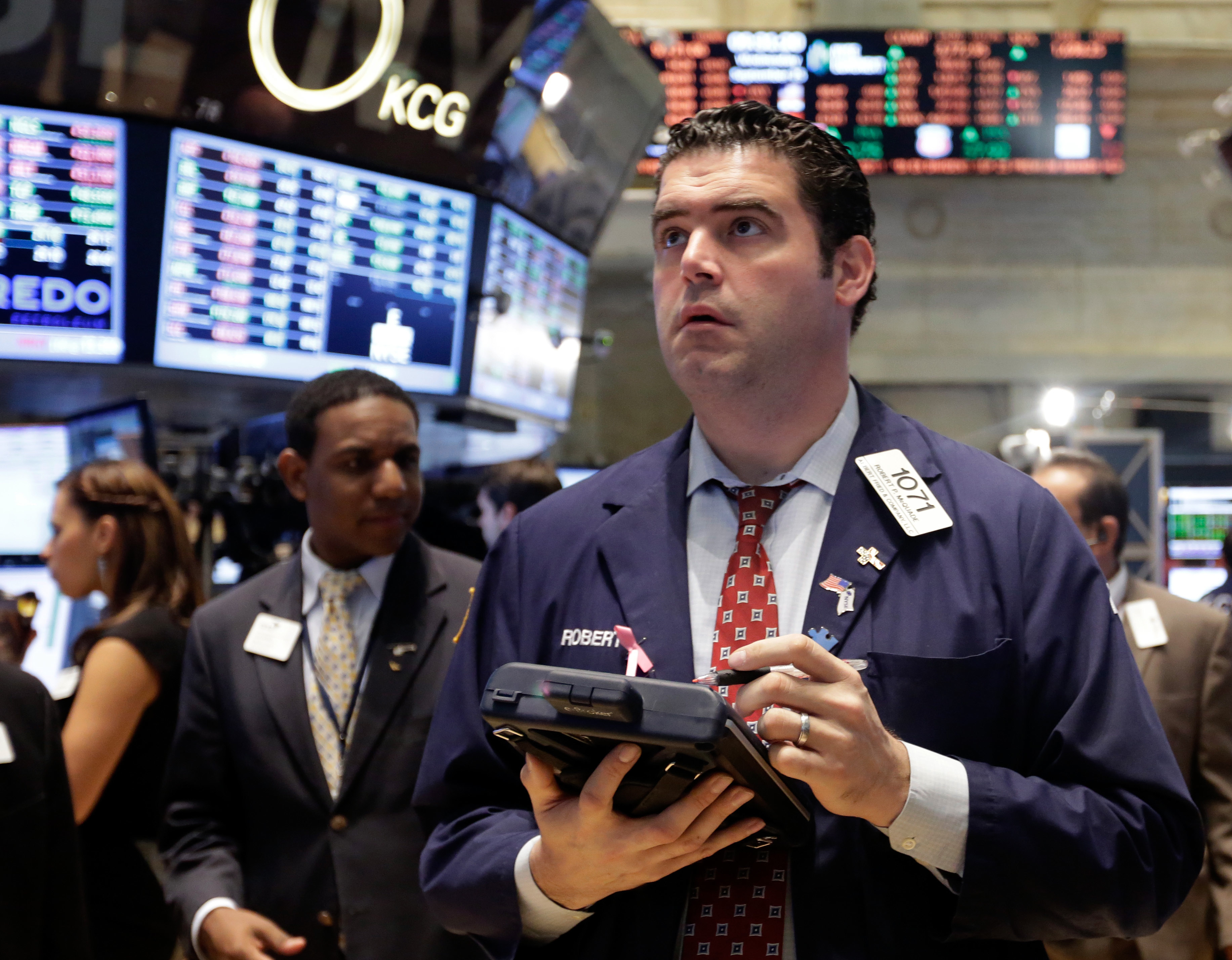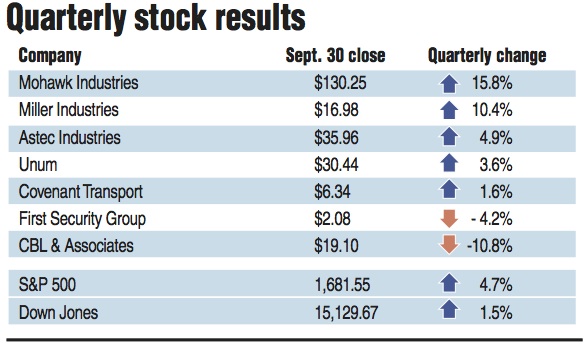Stocks fall as government heads toward shutdown
Tuesday, October 1, 2013
Stocks fell Monday as Wall Street worried that a budget fight in Washington could lead to an event far worse for the economy-- a failure to raise the nation's borrowing limit.
Investors pulled back from stocks as a budget standoff between Republicans and Democrats in Congress threatened to push the government into a partial shutdown for the first time in 17 years.
Despite the recent market slump, most company stocks still rose in the summer quarter ended Monday. The Standard & Poor's 500 index was up 4.7 percent in the three months ended Sept. 30 while the Dow Jones Industrials increased a more modest 1.5 percent.
Among Chattanooga's publicly traded companies, five of the seven biggest rose in value during the summer quarter, led by carpet maker Mohawk Industries with a robus 15.8 percent gain in its stock price.
But stock prices of nearly all companies have come under pressure as the deadline for a government shut down loomed in recent days
"The concern is government has become so polarized that if it cannot pass (a budget), there's a greater chance that the debt ceiling battle will go to the brink or possibly lead to a default," said Alec Young, global equity strategist with S&P Capital IQ.
The Dow Jones industrial average fell Monday by 128.57 points, or 0.8 percent, to close at 15,129.67. The Standard & Poor's 500 slid 10.20 points, or 0.6 percent, to 1,681.55 and the Nasdaq composite dropped 10.12 points, or 0.3 percent, to 3,771.48.
Monday's decline adds to what has been eventful September for investors. Stocks hit an all-time high on Sept. 18 after the Federal Reserve voted to keep up its economic stimulus program. But that enthusiasm vanished as Wall Street began to worry that the political bickering between Democrats and Republicans would lead to a government shutdown and crisis over the debt ceiling.
Even with the worries about a shutdown and debt ceiling, investors are still optimistic about the long-term health of the U.S. economy. The S&P 500 index rose 3 percent in September and is up 18 percent for the year.
With September behind them, investors now head into a worrisome October.
A brief shutdown wouldn't hit the economy and stock market hard. But a prolonged one, lasting two weeks, could lower the annual growth rate for the economy by 0.3 percentage point, according to a report by Macroeconomic Advisers. If a shutdown were to last the entire month, it could cut the annual growth rate by 0.7 percentage point. That is because hundreds of thousands of federal workers would go without a paycheck.
"You're putting a lot of people, at least temporarily, out of work and out of pay, and that will affect spending," said Kathy Jones, vice president of fixed income strategy at Charles Schwab. "It slows down activity on companies that depend on federal contracts."
Some investors think a shutdown could be a positive event in the long-term. The political pressure could force politicians to get down to business and negotiate -- particularly on the issue of the debt ceiling.
"This may be good thing in the long run because it may lead to compromise," said J.J. Kinahan, chief strategist at TD Ameritrade.
Treasury Secretary Jack Lew said last week that the government would run out of borrowing authority by roughly Oct. 17. The last time the debt ceiling issue came up in August 2011, it led to Standard & Poor's downgrading the United States' credit rating. The Dow went through nearly three weeks of nauseating triple-digits moves almost daily.
"This sort of political brinkmanship is the dominant reason (the United States' credit) rating is no longer 'AAA,'" Standard & Poor's analysts Marie Cavanaugh and John Chambers wrote in a note to investors Monday.
If domestic and foreign investors begin to question whether the U.S. will pay its debts, it could throw every other investment out of alignment.
"It's a threat to the center of the global financial system," said Jake Lowery, portfolio manager at ING U.S. Investment Management.
Despite fears of default, the bond market was fairly quiet Monday. The yield on the benchmark 10-year U.S. Treasury note eased to 2.62 percent from 2.63 percent late Friday. Bond investors are in a wait-and-see mode.
They can deal with a government shutdown. However, if the political dysfunction becomes worrisome enough that it raises questions about the debt ceiling, "it might be more difficult for the bond market to absorb that," Lowery said.


